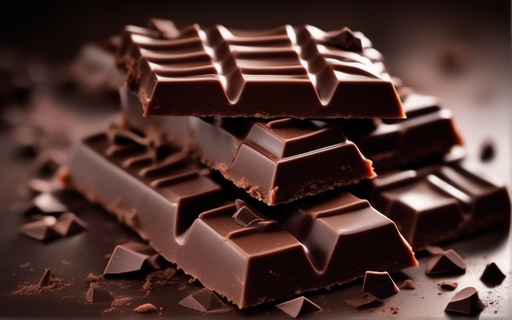Internet Asks: "Does Dark Chocolate Have Caffeine in It?"
Among the various treats that delight the palate, dark chocolate holds a special place. Rich in flavor and renowned for its health benefits, dark chocolate is a go-to indulgence for many. However, a common question arises among enthusiasts and health-conscious individuals alike: does dark chocolate contain caffeine? This article delves into the caffeine presence in dark chocolate, providing a detailed analysis for those curious about their consumption.
sponsored links

Understanding Cocoa Beans: The Source of Chocolate
Before exploring the caffeine content in dark chocolate, it's essential to understand its primary ingredient: the cocoa bean. Cocoa beans are the seeds of the Theobroma cacao tree, native to the deep tropical regions of the Americas. These seeds are the cornerstone of all chocolate and cocoa products.
- - Process: The journey from bean to chocolate includes fermentation, drying, roasting, and grinding.
- - Composition: Cocoa beans contain several compounds, including theobromine, flavonoids, and a small amount of caffeine.
- - Uses: Beyond chocolate production, cocoa beans and their derivatives are used in various culinary and cosmetic applications.
The Caffeine Connection in Dark Chocolate
At its essence, dark chocolate is made from cocoa beans, which naturally contain caffeine. The level of caffeine in dark chocolate is directly proportional to the cocoa content, meaning the darker the chocolate, the higher the caffeine.
- - Caffeine Levels: A 1-ounce serving of 70-85% dark chocolate contains about 12-25 milligrams of caffeine, compared to the 95 milligrams in a standard cup of coffee.
- - Dark vs. Milk Chocolate: Dark chocolate has more caffeine than milk chocolate due to its higher cocoa content. Milk chocolate, which contains more milk solids and sugar and less cocoa, typically has only about 5-10 milligrams of caffeine per 1-ounce serving.
Caffeine Levels: Dark Chocolate vs. Coffee and Tea
When comparing the caffeine content across popular beverages and dark chocolate, it's clear that dark chocolate offers a milder caffeine experience:
- - Coffee: A standard 8-ounce cup of coffee, contains significantly more caffeine, averaging around 95 milligrams. This makes coffee a much stronger source of caffeine than dark chocolate.
- - Tea: The caffeine content in tea can vary widely depending on the type and brewing method, but a typical 8-ounce cup of black tea contains about 40-70 milligrams of caffeine, which is still higher than dark chocolate but less than coffee.
sponsored links
Nutritional Facts of Dark Chocolate
A standard serving size of dark chocolate (1 ounce or 28 grams), particularly one that contains 70-85% cocoa, typically includes:
- - Calories: 170-200
-
- Total Fat: 12-15g
- Saturated Fat: 7-9g
- - Cholesterol: 0-5mg
- - Sodium: 5-20mg
-
- Total Carbohydrates: 13-20g
- Dietary Fiber: 3-5g
- Sugars: 6-10g
- - Protein: 2-3g
- - Caffeine: 12-25mg
Additionally, dark chocolate is a rich source of antioxidants and contains various minerals, including iron, magnesium, copper, manganese, potassium, phosphorus, zinc, and selenium.
Health Benefits of Dark Chocolate
Dark chocolate is celebrated for its health benefits, attributed to its high concentration of antioxidants and minerals.
- - Antioxidants: Dark chocolate is rich in flavonoids.
- - Heart Health: May improve blood flow and lower blood pressure.
- - Cognitive Function: Caffeine and flavonoids can boost brain function.
- - Mood Enhancement: Stimulates endorphin production.
However, it's important to consume dark chocolate in moderation due to its calorie and fat content.
Conclusion
Yes, dark chocolate contains caffeine, but the amount is relatively modest, especially when compared to coffee or tea. This makes dark chocolate a suitable option for those looking for a mild caffeine boost along with other health benefits. As always, moderation is key, especially for those sensitive to caffeine or looking to manage their intake for health reasons.
Disclaimer: This article is for educational and informational purposes only and is not intended as health advice. Always consult a healthcare professional for personalized dietary advice, particularly if you have health concerns or conditions that could be affected by caffeine.
sponsored links
References
1. USDA Food Data Central. https://fdc.nal.usda.gov/fdc-app.html#/food-details/170273/nutrients
2. Cleveland Clinic - Heart-Healthy Benefits of Chocolate. https://my.clevelandclinic.org/health/articles/16774-heart-healthy-benefits-of-chocolate
3. Mayo Clinic - Caffeine content for coffee, tea, soda and more. https://www.mayoclinic.org/healthy-lifestyle/nutrition-and-healthy-eating/in-depth/caffeine/art-20049372
4. Harvard T.H. Chan School of Public Health. “Dark Chocolate.” https://www.hsph.harvard.edu/nutritionsource/food-features/dark-chocolate/
5. Healthline - How Much Caffeine in Chocolate?: https://www.healthline.com/nutrition/caffeine-in-chocolate
6. Whitakers Chocolates. What Are Cocoa Beans. https://www.whitakerschocolates.com/blog/what-are-cocoa-beans/
People are also reading...
Does Dark Chocolate Have More Caffeine Than Milk Chocolate?
See the answer to: "Does Dark Chocolate Have More Caffeine Than Milk Chocolate?"
Does Sprite Have Caffeine?
Calories In Steak?
Chicken Taco Calories?
Does Hot Chocolate Have Caffeine?
Are Carrots Acidic?
Orange Juice pH?
Does Kahlua Have Caffeine?
Calories In a Grilled Cheese?
Is Watermelon Acidic?
6 oz Steak Calories?
Are Strawberries Acidic?
Ready to level-up?
Create meal plans 10x faster, follow up with your clients through our mobile app, and never struggle with meal planning or recipe management again.